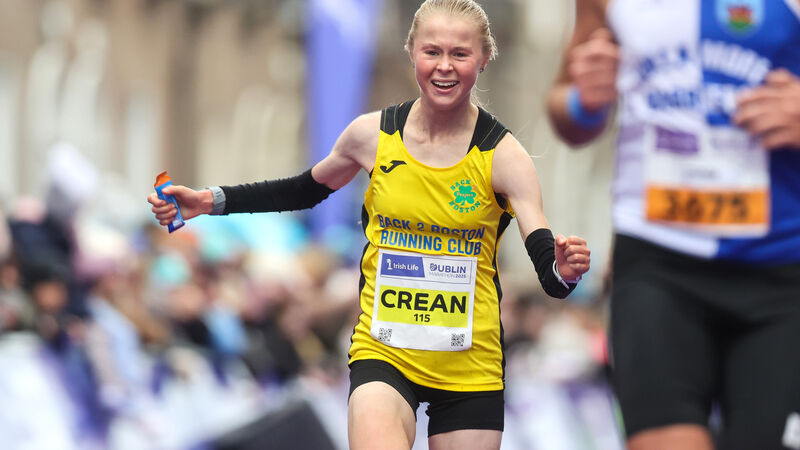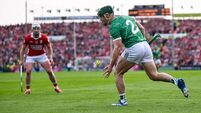Cathal Dennehy: What's next? Let teen sensation Ava Crean enjoy marathon journey

TEENAGE KICKS: Ava Crean of Back 2 Boston Running Club A.C on her way to crossing the finish line to win the Women's national title at the 2025 Irish Life Dublin Marathon. Pic: INPHO/Bryan Keane
There’s an ingrained, Pavlovian response among athletics anoraks whenever a teenager does something special. Soon after heralding their performance, they’ll often pitch a question that’s forged through the wisdom of experience: OK, but what happens next?
There’s no event where athletes, on average, peak in their teens, with the typical peak age rising the further up the distances you go. So when a 19-year-old like Ava Crean wins the national marathon title in Dublin in 2:34:12, it’s inevitable that many swiftly move on from what she’s done and start to think about what she might do.
Crean’s victory was widely lauded, and rightly so, but you didn’t have to go far in the comment sections to find someone raising concerns. Should a 19-year-old be racing the marathon? Conventional wisdom suggests waiting until your late 20s before focusing on the 42.2km distance, when you’ve maximised your potential on the track and your body is better able to withstand the training.
But that view is chiefly from those entrenched in the sport, who see track as the Carnegie Hall of athletics and the marathon as a sort of career endgame. That view, however, has been challenged in recent times with a slew of East Africans moving to the marathon in their early 20s, knowing the financial rewards are far better than those on the track.
Running one in your teens is unusual, but not unprecedented. Crean’s fellow Limerick native Neil Cusack made his marathon debut at the age of 19, winning the 1971 Peach Bowl Marathon in 2:16:18, three years before claiming his historic victory in Boston. In 2015, Eritrea’s Ghirmay Ghebreslassie won the World Championships marathon aged just 19, although given the uncertainty around birth dates in East Africa and the incentive for athletes to misrepresent their age, it’s possible he was a few years older.
Still, the marathon takes time to learn and to master. When Kenenisa Bekele, widely regarded as the greatest distance runner of all time, was making his move to 26.2 miles in 2014, his longtime manager, Jos Hermens, captured the size of the challenge: “The marathon – it f***s you up.” It’s an event largely ruled by athletes in their late 20s and early 30s. In the six Marathon Majors this year – Tokyo, Boston, London, Sydney, Berlin and the World Championships – the average winning age was 29. The oldest winner was 33, while just one was under 28: Tadese Takele Bikila winning Tokyo at the age of 22.
But the blanket covering top-class marathoners can span generations. Mayo native Sinéad Diver – who now runs for Australia, having emigrated to Melbourne in her mid-20s – only found running at the age of 33 and in 2022, aged 45, she ran the fastest marathon ever by an Irishwoman: 2:21:34 in Valencia. Now 48, she recently ran a 70-minute half marathon. Diver has never wanted to be a great runner for her age – just a great runner. “I don’t care about the masters records,” she once told me. “I kind of wish people would get over the age thing.” Crean’s story has parallels, albeit at a different point on the bell curve. She did climbing, karate, camogie and basketball in her youth but never athletics. She took up running to stay fit during the pandemic, hopping on an old treadmill at home and she was unable to run 500 metres without stopping. Last week, I asked Crean if she ever noticed her strong endurance while playing field sports. “I’d just think I was the same as everyone else,” she said. “There were a lot of people on my teams fitter than me.” Slowly, she built up her training volume until she was doing 20km per day around her native Raheen. After enrolling at university in Manchester last year, she decided to sign up for the Manchester Marathon in April and the Great Limerick Run in May – not viewing either as a race, purely as runs.
She shocked herself in Manchester, running 2:49:26, before winning a week later in Limerick in 2:43:39. Only then did she come under the guidance of a coach, John Kinsella, who has since introduced a weekly long run and interval session, their effects clear in Dublin last Sunday as Crean claimed the national title ahead of defending champion Ann Marie McGlynn.
As one of the race commentators, two-time Olympian Michelle Finn, put it: “That was so, so, so good. She’s definitely… I would say somebody to look out for in the future, but she’s actually somebody to look out for right now.” That same day, Elizabeth Egan, a Wexford native who works with various sportspeople on lifestyle and personal development, posted on X about her dislike of that oft-repeated line, “If you’re good enough, you’re old enough,” noting it was her “least favourite statement in the sport”.
There’s a solid foundation for that. So often, young athletes are pushed into situations they’re not ready for, sometimes physically but more often mentally, emotionally. Properly caring for young athletes starts with putting their long-term interests first, avoiding the temptation of low-hanging competitive fruit. But it’s worth noting here that the only impetus for Crean to run the marathon came from within. For her, the sport is about enjoyment and personal challenge.
“I just found it fun,” she said. “I never even wore headphones (in training). I still don’t.” Until this year, she didn’t know of Fionnuala McCormack – a five-time Olympian and one of Ireland’s greatest distance runners. McCormack, 41, recently finished ninth in the World Championships marathon in Tokyo, 18 years on from her debut at that event, proof that being a teenage prodigy is no barrier to a long and successful career – once you enjoy it, stay committed and make smart decisions. McCormack, a mother of three, doesn’t own a smartphone. Crean, meanwhile, learned about the marathon by following running influencers on TikTok.
Distance running is booming in popularity among Generation Z, with a growing number preferring to go hiking or running early on a Sunday morning rather than stumbling home from a night club half-cut. As such, it’s hard to apply the sport’s usual conventions to Crean, whose first ever race distance was 26.2 miles. And it’s not like she suddenly ramped up her training for Dublin, having run 140km per week consistently over the last couple of years, and she has no plans to increase that.
The marathon may still be arduous, but running long distances on the roads is no longer what it was when Bekele et al made their transitions over a decade ago. The arrival of super shoes, which protect the lower legs so much better, has made it far less attritional. Crean has heard the concerns about running marathons so young but it’s where her heart lies. “People have said, ‘Just stick at the 5K, get fast at that,’” she said. “But the marathon is such a hard task – I love it.”
Could she get a lot better? Undoubtedly. But even if she did nothing after this – and given her ability and the guidance she’s receiving, that seems very unlikely – what she did in Dublin is still one hell of an achievement, one that can be lauded without worrying about what might come next.
What matters most with a promising young athlete? That she’s enjoying it, and Crean quite clearly is. That approach could carry her a long way in the sport.



